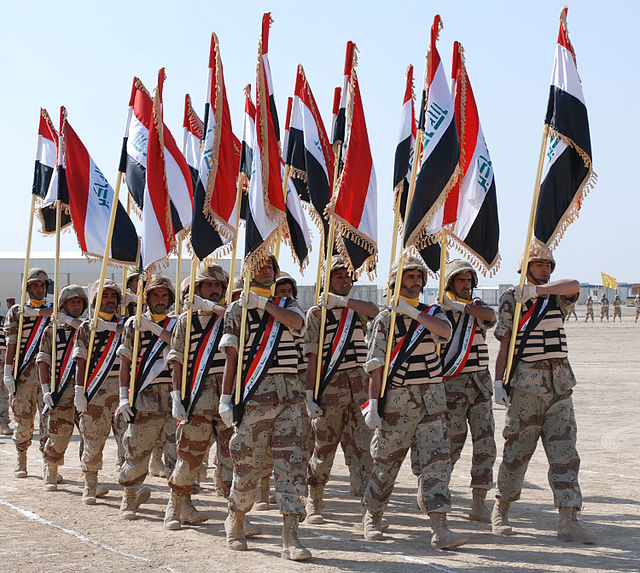Obama’s abandonment of Iraq and the fall of Mosul

As soon as Obama was elected it became a foregone conclusion that this would be the result in Iraq—that the country would be taken over by the worst forces in the area. Since then, it’s been a slow denouement:
Insurgents seized control early Tuesday of most of the northern Iraqi city of Mosul, including the provincial government headquarters, offering a powerful demonstration of the mounting threat posed by extremists to Iraq’s teetering stability.Fighters with the Islamic State of Iraq and Syria (ISIS), an al-Qaeda offshoot, overran the entire western bank of the city overnight after Iraqi soldiers and police apparently fled their posts, in some instances discarding their uniforms as they sought to escape the advance of the militants…The collapse of government forces in Mosul echoed the takeover earlier this year of the town of Fallujah in western Anbar province, where U.S. troops fought some of their fiercest battles of the Iraq war…
The Iraqi government is asking for international and/or US help, “by virtue of the Joint Cooperation agreement between the two countries.” But that horse left the barn a long time ago.
As a result of Obama’s decisions regarding the Iraq pullout, there are not even any residual US forces left in the country, as remain in so many other places where Americans have fought and died:
In order to land an effective fighting force to defend Baghdad and retake Mosul, we would need to commit tens of thousands of troops and a large amount of materiel in a big hurry. Logistically speaking, that would be a feat worthy of George S. Patton and the Battle of the Bulge in order for us to get to Baghdad before ISIS does, especially with Iraqi security forces collapsing.Politically speaking, it’s a dead letter.
David French at National Review thinks Obama’s policy on Iraq demonstrates his foolishness rather than his knavishness:
At the heart of the Obama administration’s folly is a set of unshakeable convictions — gained through long-term exposure to the total nonsense that passes for foreign-policy analysis in America-hating quarters of elite academia — that jihadist rage is ultimately grounded in a series of legitimate complaints against America and Israel (rather than in its own dedication to Islamic supremacy), that concessions improve relations, and that the right kind of tone and respect for Islam will soothe hurt feelings and build bridges of trust. In reality, the jihadist mindset can be summed up in eight simple words: “Give them nothing, but take from them everything.”
I beg to differ, although it makes sense because Obama is both a narcissist and a man who used to present himself as a liberal, and liberals do actually believe that sort of thing. But Obama really doesn’t care all that much about making peace there, although that would be a nice feather in his cap, too.
What else might be motivating Obama’s Iraq policy? He was and still is eager to (1) placate his base, which has always been against the war in Iraq (2) reduce and then eliminate America’s influence in the region and around the world (3) undo the work and efforts of his predecessor George Bush and his enemies the Republicans; and (4) reduce and then eliminate trust in America around the world (which is related to #2 but not exactly the same).
Whether Obama actually cares about the fate of Iraq and the Iraqis depends on whether he’s trying to promote the jihadi cause around the world. Certainly it seems so more and more, especially after the release of the Taliban Five, which threatens to help complete the same job in Afghanistan.
But perhaps he’s mostly indifferent to the jihadi cause, and his policies could just be a subset of his wanting to take America down a peg or two—or three or four or more. Perhaps he doesn’t really give a hoot what happens to the Iraqis or the Afghans either way, and the pullout was done to advance his other aforementioned political and geopolitical purposes.
At any rate, this is certainly true:
This [the takeover of Mosul] is the reason why it made sense to keep American forces in Iraq as a back-up to Iraqi security forces, but that option is all but dead now. Unless Iraq finds some deep well of nationalistic strength and repels ISIS on its own, the only democratic Arab republic may be very short-lived indeed.
Whatever Obama’s true motivations, by the time he got elected the public’s sentiment on Iraq had reached the point that it would have taken resolve on the part of a US president to stay there. Bush had that resolve. Obama not only did not have it, he had the opposite: a strong resolve to leave.
And so it has all come to pass.
[Neo-neocon is a writer with degrees in law and family therapy, who blogs at neo-neocon.]
CLICK HERE FOR FULL VERSION OF THIS STORY